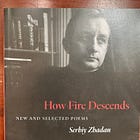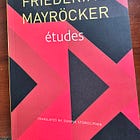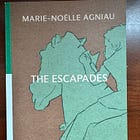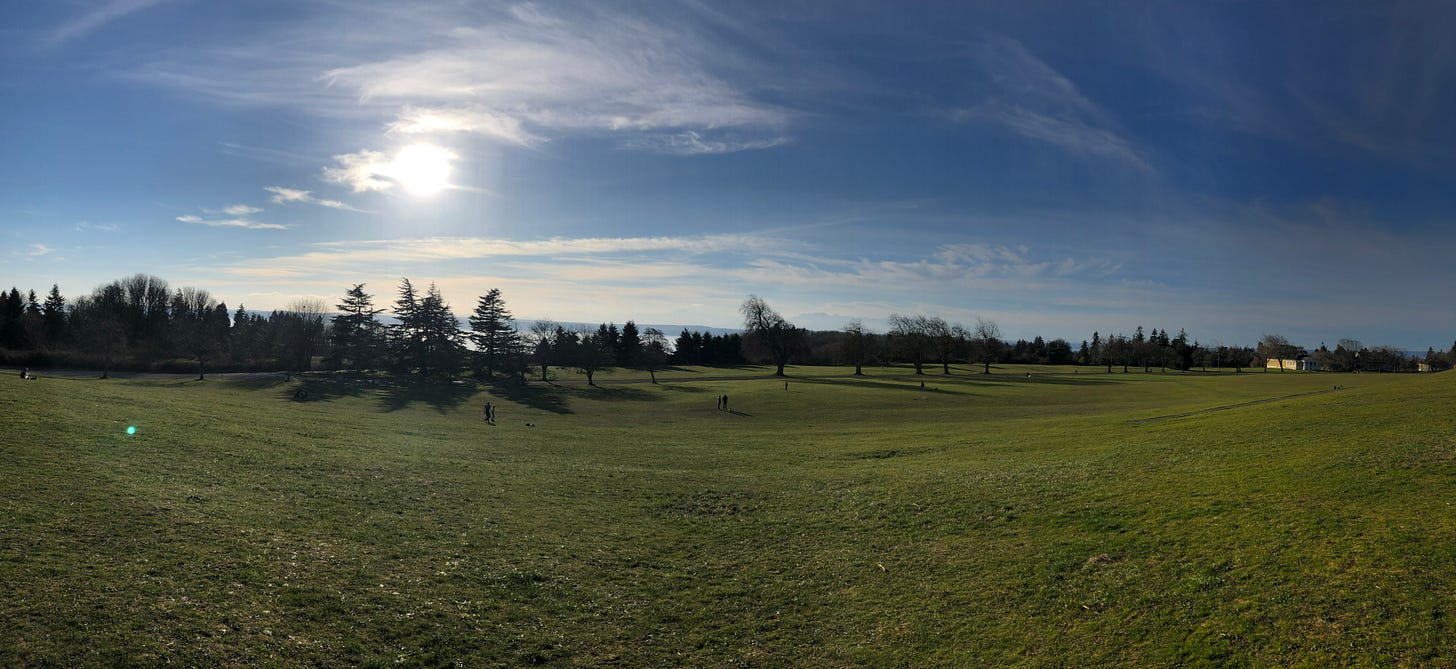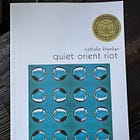Poetry, the necessary jewel that it is, is only one means of accessing that most active soul of the poet. I read poems because poems are meant to be read. And I try to insist on poetry to others because poetry is like the moon’s insistence to language’s tidal currents. I have been reading Jacques Derrida’s essays in “The Politics of Friendship,” where he writes of Aristotelian poetics, “… and poets are quoted, more than once called up to testify, even as judges of truth.” Poets here, I must insist, cannot be the self-descriptive labeling for the purpose of sales and consumerism; rather, individuals whose souls are rich with endeavors of language, indulgent expeditions where language may walk off its path and poet may be relied upon to follow or pull it back to safety.
From the French surrealist Paul Valéry in his semi-autofictive novel “Monsieur Teste,” “My soul longs to be surprised more than anything else. Expectation, risk, a bit of doubt, these exalt and vivify my spirit far more than certainty.” The only way I know to insist is to do so diligently, repeatedly. And so, here we have this. The last few months of poetry readings from books by authors who are living and attesting to a form of being judges of truth.
The thirteen books below shared, in my mind, some semblance of voice, subject, or purpose. Though another time of Cody may argue that it is impossible to truly connect such disparate lyricisms, poets from different countries and times, but still they coalesce into something of a compounding attention. The reader witnesses in moments of political fracture language buckling under the weight of surveillance, and the desire to speak what systems refuse to hear. And I am not here to say all poetry is great response to politics, nor is it inherently resistive, but the inclination towards language from poetry is to refuse the spectacle of the situation and instead shape resistance into meter. Poetry becomes this fascinating site where critique and form blur, where metaphor adores and refuses the literal. In the tremor between lyric and declaration, between the intimate and the collective, poets write through crisis not only to describe but to rupture the architectures of power that sustain crisis itself.
The political poem, or poem-in-response-to-politics, has long existed in a tense field between the slow labor of craft and the brutal immediacy of state violence, climate collapse, and systemic injustice. But what feels urgent now is the poet’s refusal to separate the personal from the structural. To write a line about breath, about water, about lineage or shelter or silence, is to write directly into the entangled economies of exploitation and survival. Similarly, to write of one’s happiness with a cup of gas station coffee is just as potent of a survival as the poem following afterward where said gas station was reduced to rubble from another bombing. Poetry does not solve crises; it interrupts them, irrupts. It makes audible the costs of abstraction and the texture of lived contradiction.
Criticism is dual-purpose then both in proving that reading and truly thinking from and with a text is possible as well as discussing how a lyric moment contends with its own moment-being-resisted. To identify complicity and note malcontentments, to note risk and the weight of said risk, is the job of the dutiful reader. Continuously governments bombard the average citizen with demonstrations of language’s demonization, that language has become contested. The illegality of language is only another way in which poetry’s task is now living through crisis.
The political does not only arrive through spectacle or event; it infiltrates the interior, embeds itself in memory, sensation, and dream. Poetry becomes a site of psychological excavation where language works like a tuning fork pressed against the self, registering frequencies of grief, paranoia, longing, and disorientation. This time of plaguing and delaying critical thought yields an introspective element built for confrontation. That to look inward is to examine how cultural constructions are inscribing their runic networks onto bodies and mind, metabolizing toxins into the nervous system and slurring the tongues.
This harkens to my evergreen hollering toward the import of community. An “I” whether lyric or otherwise can no longer be a solitary subject but rather the nodal interpolation of adjoining communities and forces of power. Nobody I know is doing well. Everybody is haggard and exhausted. And still when greeting each other individuals stress their love in the same breath as they pant for air. The introspective element of poetry allows for the gasping to have room to exist without the shame or rage of public perceptions, allows vulnerability to insist on its legitimacy in this culture that wants to ignore and press forward.
So, here’s some recommended readings. I hope you’ll listen and perhaps pick these books up.
Press: Milkweed Editions
Published in: 2024
His fifth book, Rick Barot’s poems in “Moving the Bones,” are at once tender and attentive to the details in which kinds of grief afflict all of life’s movable subjects. And what, after all, is more surprising than to reveal the depths of everyday life? Additionally, Rick is an incredible teacher, tremendous support for the PNW poetry community at large, and generous friend. It would behoove you to read this work.
Press: University of California Press
Published in: 2002
“Commons,” holds a destabilization of language that can only be conveyed meaningfully on a page by someone who can attest to a true depth of thought toward its purpose. The work contends with histories, geographies, and a rich love of research, philosophy, and education. I think of the following quote describing Myung Mi Kim’s work, from College Literature authored by Zhou Xiaojing in the essay “‘What Story What Story What Sound’: The Nomadic Poetics of Myung Mi Kim’s ‘Dura.’”: “This hybrid combination foregrounds Kim's experience of what is "ostensibly called Korean language and culture" in "ever new formulations" an experience which is still in the process of being reshaped and transformed by historical forces, geographical and cultural dislocations, and current social conditions.”
Press: Ecco Press
Published in: 2024
Hala Alyan has two novels and five books of poetry - this vast wealth of literature to dive into can only be a blessing. Alyan’s work is astounding, playing with lyric in the way that only one who has committed their life to a craft can do. The book this reads from, “The Moon That Turns You Back,” is her latest poetry collection and contends with the genocide of Palestinians now, as well as the almost century-long nakba, and imperial-colonial traumas alongside the contemporary complicities of life.
Press: Yale University Press
Published in: 2023
Serhiy Zhadan’s “How Fire Descends,” is a collection full with poems attempting to usurp the paralytic melancholies of grief with a supportive camaraderie. As Ukraine continues to receive bombardment and assault from Russia in this conflict that seemingly no citizen wishes to be a part of, a poetry from Ukraine’s consistent and steadfast voices assure its tradition and history is kept alive.
Press: Seagull Books
Published in: 2022
One day I hope to have the freedom in my language that Friederike Mayröcker shared throughout the latter collections of her career. “études” is a collection of diaries, essays, or poems, depending on your mood or perspective all of which carry with them a decadence with language that emulsifies obfuscation into a type of icing. Mayröcker carries us, readers, with her on walks, greeting loves, to performances and readings and dates, as only an artist fixated on their presence within would.
Press: World Poetry Books
Published in: 2024
Agniau’s “The Escapades,” translated by Jesse Hover Amar is an incredible study in linearity. At once the verse is free, bounding through the wilds of imaginative and creative capability, as well as compounding within the cavernous folds of the mind. Places and images are revisited time and time again as one’s fixation becomes the generativity of poem. In that gravitas of earthly being, where does one find their self, transformed among the brambles and nestled into the dirt?
Press: Otis Books
Published in: 2018
Mostafa Nissabouri’s “For an Ineffable Metrics of the Desert” translated by Guy Bennett, Pierre Joris, Addie Leak, and Teresa Villa-Ignacio is a tremendous accomplishment in pursuing a Paz-like metaphysics of grandiose structures. The desert, so simultaneously symbolic and threatening and homely; mountains so simultaneously emblematic of fortitude and of one’s infinitesimal smallness. Reading this collection one stops to wonder how can one make of this world anything less than poetry.
Press: Nightboat Books
Published in: 2018
“Crosslight for Youngbird,” is at turns meditative and exploratory, historical and generative, archive (living) and archive (passed). Wadud makes me wonder about the purpose in documentation to recitation, the purpose behind memory, and the convolution of memory’s manipulations. I arrive from having read this work thinking about the theory of what it is our hands and fingers really, truly, set out to do when we arm ourselves with pen or keyboard, whether they too are overtaken by a language atypical to our minds.
Press: Nightboat books
Published in: 2020
Instead of my own review, I give this snippet from her interview.
Here’s the space to talk about anything/one that might have influenced this work. Perhaps you could also tell us what you’re reading/watching/listening to right now.
To name a few: Etel Adnan, Ghassan Zaqtan, Adania Shibli, Hussein Barghouthi, Mahmoud Darwish, Larissa Sansour, Asta Olivia Nordenhof, Adrienne Rich, Carolyn Forche, Craig Santos Perez, Maggie Nelson. I’m reading Muriel Rukeyser, finally. Lebanese Etel Adnan’s poems and writings are foundational texts to me and have sustained me on three continents, especially the riveting cartographies of The Arab Apocaplyse, and In the Heart of the Heart of Another Country. Palestinian artist Larissa Sansour’s video art with Søren Lind is dystopian yet gorgeously evocative. There’s that moment in her beautiful and terrifying and beautifully terrifying short sci-fi film In the Future They Ate from the Finest Porcelain (2016) where the narrator says, “the Apocalypse is never that single cataclysmic event. It sneaks up on you.” Full of radical possibility, her films so movingly upend the idea that Palestinians’ contemporary reality—the injustices and unbearables of it— is irreversible, indeed the idea of any disenfranchised community’s reality as a given.
Is there anything you’d like to add by way of autobiography—anything from your personal life, beyond/outside your writing life—that might be of interest to readers, or might give them another angle of insight into your work?
My mother was a Finnish immigrant, my father a Syrian refugee. They met in Copenhagen and settled down there. I grew up in Denmark then, inside Arabic, Danish, and Finnish, in the intersection of three language families. I always wondered about mother and father tongues and other tongues. In an early memory I would sing along to F. R. David’s hit song “Words Donkomisy.” It was such an irresistible love song and donkomisy seemed to me then such a perfectly round and whole word. Until by chance I began to separate the sounds. Words Don’t Come Easy. They still don’t!
Press: Sarabande Books
Published in: 2024
Roleplaying is a subject of immense pleasure and fascination for me. In that way, the concept of invention and fictive elements draw from a reality that once was but perhaps has passed, Marianne Chan’s “Leaving Biddle City,” is simultaneously an effort of creating home as well as one of documenting the colonialist stripping of a home. Who does ‘I’ become in terrains where, when walking past businesses named after individuals, you confidently know each of those individuals? What happens when you no longer know them? What happens when the business no longer has that individual identity to it? These are the geographical questions at stake here: what marks a home as knowable, and what stark contrasts abound when familiarities are massacred?
Press: Sublunary Editions
Published in: 2021
While it has been months since I read, Magda Isanos’ “Homecoming,” translated by Christina Tudor-Sidere from Romanian, took three pages before I was hooked. This is not to say the first two were particularly noteless, but rather that by the third page I remember distinctly the feeling and affirmation, sitting there reading and knowing that I would not move until I had finished reading the work. And so it was. The poems in this collection are rich journeys speaking of a lyric attentiveness to the fringe of externality.
Press: World Poetry Books
Published in: First published in 2013, translated in 2024
Afrizal Malna’s “Document Shredding Museum,” tr. from Indonesian by Daniel Owen is a declaration to the injustices of being a citizen, the injustices of being a colonized citizen and an individual trying to ascertain their self beyond the colonized subject. The poems in this collection are potent with the cries of outrage toward gubernatorial obfuscations and imperialist destruction. Yet, through them all, there is a rich envelopment of community: of the real people who comprise the moments of survival, who color your world. This is lyric through suffering.
Press: Shearsman Books
Published in: 2016
To Elsa Cross, poetry is not an answer to life’s questions but rather a means of exploring the depth and width of the question itself. What dimensionality is carried within “Beyond the Sea,” takes form in transporting the reader alongside Greek mythologies, to a conspiratory unraveling of identity. Who are we when histories collate within the self? Poetry might not have the answer but it certainly has a response here.






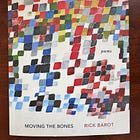
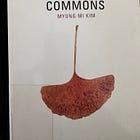
![Poetry Reading: "Brute?" and "Strike [air]" by Hala Alyan](https://substackcdn.com/image/fetch/$s_!xWz0!,w_140,h_140,c_fill,f_auto,q_auto:good,fl_progressive:steep,g_auto/https%3A%2F%2Fsubstack-post-media.s3.amazonaws.com%2Fpublic%2Fimages%2F955e8b16-75ef-43d5-b7fe-6c6d0a3de85a_1536x2048.jpeg)
